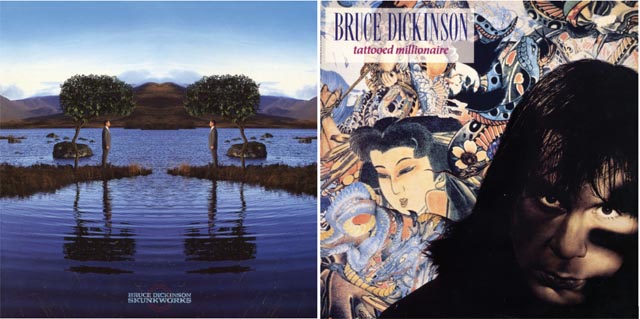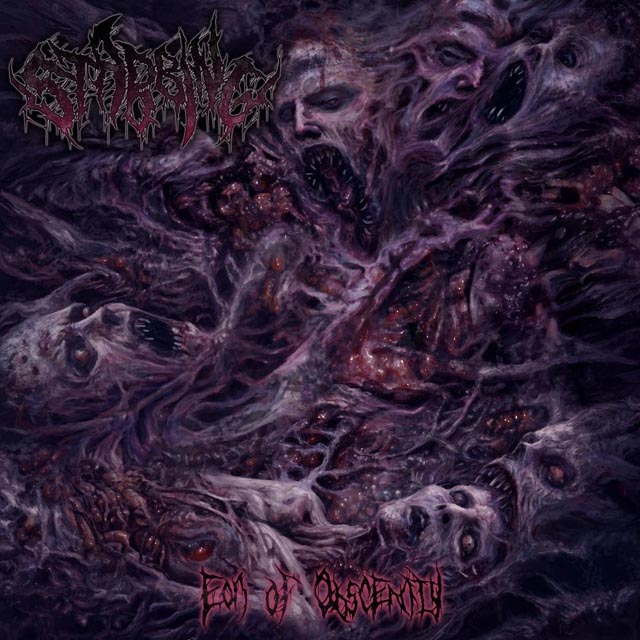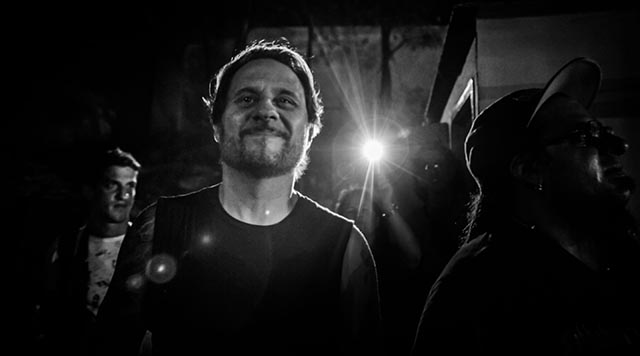
Legendary Dave Lombardo, known for his works in Slayer, Suicidal Tendencies, Mr. Bungle, and many more, has participated in a new adventure, making an incredible score for the impactful documentary, Los Últimos Frikis. Directed by Nicholas Brennan, the doc was filmed over the course of ten years following the Cuban metal band Zeus, who were icons in the Cuban metal scene. The group has faced a series of restrictions under the regime of Fidel Castro’s communist government, as they went through constant struggles living under such vast suppression. The film continues to follow the band embarking on a tour to celebrate their 30th Anniversary, which took them into another series of challenges beyond a band’s worst touring nightmare. Despite these struggles, the group never gave up on their passion for music. The film is now available on Topic and Vimeo on demand, which we highly recommend. We caught up with Lombardo to discuss scoring the film, the hardships these members experienced and learning how to appreciate life a little more.
Watching Los Ultimos Frikis gave me more of an appreciation for what we have here in the States with live music, even during COVID. Watching Zeus struggle on their tour and the difficulties they faced was hard to watch. As a musician, what is your take viewing their struggles?
Well, like you pointed out, I mean, it really makes you appreciate what we have here in the States and the rest of the world, and just how diverse we are as far as music is concerned that we have all kinds of different music. You can go see some pop music one night and go to a hardcore underground club another night and there’s a bit of a market for it all. At least there’s a crowd that would see music of this, whatever kind you choose. You feel like there’s such a variety here in the States, and like I said, the rest of the world, not including all countries, but for the most part, the majority. It’s really sad what they have to go through over there, especially with that style of music called reggaeton, which has become probably the only music that they’re allowed to listen to. It’s really disheartening and it’s kind of sad.
It’s very sad. What was the experience like for you when you were approached to score this Documentary?
It was funny, because actually, he hit me up, Nicholas Brennan, the director, hit me up approximately nine years ago and he said, “Hey, I’m working on this film that includes, it’s a story about a metal band in Cuba.” At first, I was totally honored that he thought of me to score and taking a risk with someone that has had experience, but never took on a whole score himself. He trusted me so I am happy for that.
And then I think it was probably seven years later, eight years later, we met up in New York City and we had a meeting and he showed me some footage. And that’s where it all came, it was like a reality. It’s like, “Wow, this is really happening. He’s really doing this.” Because I had forgotten about the project for a while. But then when I saw some of the footage, it became very real of what this project was about. It was exciting when it all came together. When I started to work on it, when I started to receive the stems and some of the visuals and stuff that I had to apply certain atmospheric sounds and some string instruments and all that instrumentation that goes along with scoring a film. So again, I was very happy and honored. This film couldn’t have been a better topic for me to introduce my skills when it comes to scoring documentary and film.
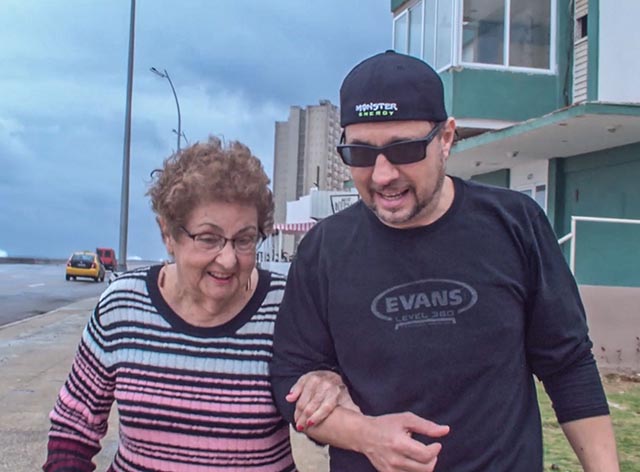
It’s definitely just a powerful movie. What was it like for you to get to know the guys in Zeus?
Actually, it was the first time I’d met them, I had gone, I set up a trip with my wife and my mom. My mom, she was 87, I believe, when I took her over. It was funny because family members were like, “No, she can’t travel.” I said, “Yes, she can. She’s strong. Come on, look at her.” And so I took her and she had a great time. When I got to meet everyone, it was really exciting because I had heard of Zeus. Well, I don’t remember exactly around what year. It had to have been between ’84 and ’86.
My brother-in-law at the time, my sister’s husband, he was an avid Latin jazz and Cuban music record collector. He turned me onto a lot of different music, but he was also into books and different authors. There was a particular book that mentioned Che Guevara, one of the revolutionaries, the whole Cuban thing, Fidel Castro’s right-hand man, that his grandson was into metal and one of his favorite bands was Slayer.
The book also mentioned metal bands in Cuba and Zeus was one of them, because for some reason that name just stuck with me. And so when I met them, I met Diony, the vocalist, first., I remember when I first walked in to this club called The Yellow Submarine, where I did a little press conference and I spoke to some of the journalists and some fans there, I got to meet him and he was a really cool guy. All of them, even Yandi, the drummer, I was able to gift him with a set of cymbals and I believe some pedals and a bunch of packages of drumsticks because musical equipment is very difficult to come by and acquire. So they really loved and appreciated that.
And then they got to play with us when Suicidal was able to book a show in Cuba and they opened up for us. And so that was a real treat as well. Great bunch of guys, very humble. They just love metal. I’m sure you saw in the movie how passionate they are about playing, that there’s a story towards the end that they used to hang out at a pier and they used to go swimming, but they used to bring their radios and used to tune in to the rock stations in Florida. They would hook up, everyone would bring the radio and all tune into the same station. So they’d have the music blaring and swimming out in the ocean and stuff. Those are the things you do when you love music, you always find a way to search and listen to new stuff.
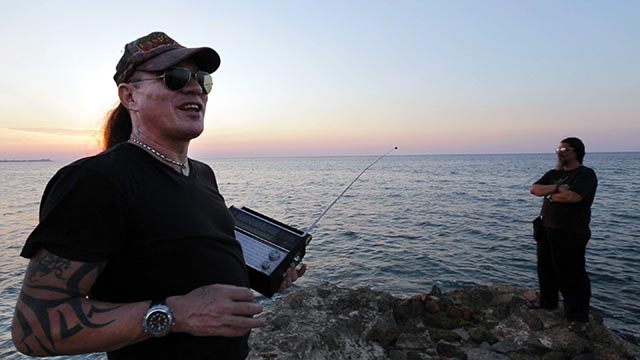
I definitely admired their passion in the film. It was very touching and moving, heartbreaking in a way.
Yeah, it was.
With COVID-19 happening and basically the chaos the United States is in right now, politics is definitely a hot issue. And seeing how this band was shunned by the government made me wonder how things could possibly change in the U.S., with things like the rise of cancel culture and an increased division. What are your thoughts on the possibilities of bands or artists out here getting canceled due to overall differences?
Oh, there’s always going to be differences, whether it’s political or style of music you listen to, that’s always a possibility. The whole political thing, I stay away from all that. It’s a mess. So I just rather keep my political views personal and just not really express my opinion on that. But we’re very lucky, we have freedoms that in some countries, they wish they had, freedom to travel, freedom to do basically whatever you want. I don’t think the people that complain here in the States about the current state of affairs, that they really know what it’s like to be in a country where there is real oppression. And so I think we all should just count our blessings.
There are different countries where you can get arrested for being in a metal band. Throughout your career, were there any countries or moments where you were forbidden to perform based on being in a metal band or appearing too “satanic?”
I believe Slayer played in Singapore, and in Singapore, they didn’t want us to play a certain song. I forget what song that was. I don’t remember what came out of that, if we played it or not. It’s a faint memory in my mind. Apparently it wasn’t a big issue. But yeah, I mean, they said, “No, we don’t want you to play this song.” I think it might have been off of Christ illusion, maybe the song Cult. But then again, don’t quote me. I’m not sure. But yeah, I mean, that was probably the only time. We were in Turkey, I believe. We played in Istanbul, Big Four, and I had done an interview and I was trying to look something up on YouTube, and a video that you would normally be able to search in the States or any other part of Europe. But in Istanbul, they had a block on there. So yeah, we haven’t been in places that, or I haven’t been in places where there’s been too much oppression.
I guess you’ve been very lucky with that,
Yes. I wouldn’t go to those countries anyways, man. If they don’t like metal or don’t appreciate other styles of music, I don’t think I should be going there. It’s like, “Hey, let’s take a vacation to Afghanistan.” Really? Why? So yeah, it’s just one of those things.
Since this was your first film score, do you have any plans on working on another film?
Well, nothing on a scale like Los Ultimos Frikis was. But I just finished, I think, a title or the theme track to a Chinese film called Railway Heroes. That was a lot of fun. It was just one song and it’s the theme song to the movie. And so I just wrapped that up, but nothing at the length or the scale of the Frikis movie. I hope to do more of that. I really enjoyed it. I love adapting music to whatever emotions are coming out of the film or the moment of the film and what you need to adapt or the style of music you need to adapt to that. Of course, with the help of the director. I mean, that’s a lot of fun. So I hope there’s more. But at this moment, there isn’t anything in the works.
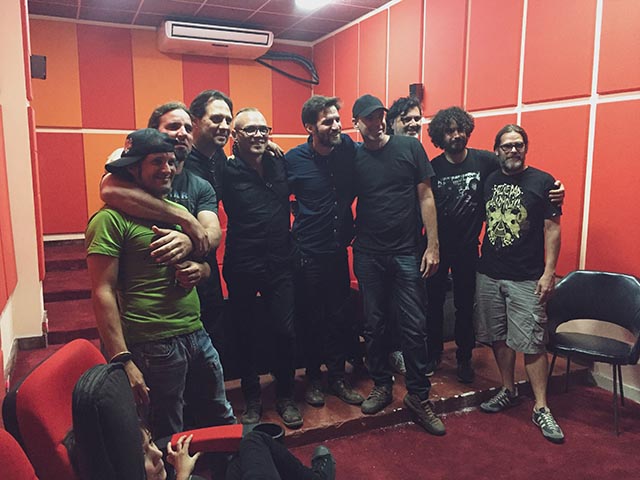
You’ve been working on quite a few projects over the years: Slayer, Suicidal, Mr. Bungle, to name a few. Was there ever an album or song that challenged you the most as a drummer?
I mean, no.
That’s fine, too.
I mean, when you write it and you’re in the creative process, you’re pushing your limits. Yeah, sometimes I think to myself, “Holy shit, could I have written this a little more demanding for me?” Energy-wise, it’s like after I’m done performing the songs, you’re catching your breath and you’re like, “Man, I could have made this song a little easier.” But I choose not to, because I love the challenge. But in particular, any song, no, they’re all fun. And I’d do it the same way again.
Speaking of projects, do you have anything for the listeners to know about any news on Suicidal or something else coming up?
There’s a lot coming up, but not much I could talk about now. There’s a UK band that I’ve already collaborated with. During the pandemic, they sent me some music and I agreed to it. I recorded it at home. I hope they release it soon because it’s very exciting. And then another metal band hit me up during that period. Again, I recorded the drums at home, and I sent them back, and they loved it, and that should be out soon.
You’ll hear about it. We’ll probably come back around and do interviews again. And so yeah, there’s just a lot going on. There’s two other projects that are a bit of a surprise that I don’t think metal fans are going to embrace unless they have a very soft spot in their heart. That’s another. I think the challenge for me isn’t the music that I write or the music that I perform, I think it’s trying to convince people that, “No, you still love metal. Just because I’m not doing it all the time, it doesn’t mean that I don’t enjoy it or I’m not playing harder and heavier stuff. Metal, and thrash, and hardcore music is something I thrive on.”
I don’t think that’s a style of music I’ll ever abandon or neglect. I think that’s something that is always going to be on the forefront of my mind. Every now and then I just need to try something new to recalibrate myself, to recharge myself. So when I do go back to metal, it feels fresh and new. Otherwise, if you stay down the metal path, it’s like, “Okay, how much double base and thrash can you do?” I need something a little more than that. So there’s a lot more on the way and I can’t wait to put it out because I love to hear the reaction of the fans.
It’s funny, because you’ll do everything metal, and the one thing that you experiment, everybody will be like, “What is this?”
Yeah, exactly. That happened recently. It’s like, “Oh, don’t you like metal or don’t you like trash anymore?” It’s like, “Dude, I just gave you a Mr. Bungle album, The Raging Wrath of the Easter Bunny demo, and that is more thrash than anything else I’ve been a part of. And you’re still asking that question.” And then it’s just… It’s funny. It’s just people, they’re just not informed and they’re just very opinionated. That’s just the way of the world today.
Is there anything else that you want to say or add about the film?
Well, number one, I’m very proud of it. Two, I hope, one day, at least in my lifetime, that I can see the country I was born in to live life to the fullest instead of being imprisoned on this island. When I went back to Cuba, it was heartbreaking. It was heartbreaking to see the conditions that people lived in, but their inner strength to survive and prevail, it supersedes any kind of oppression. The smile on their face and how sweet they are and kind, that says a lot about the kind of people that are on that island. They don’t deserve this government. The movie really shows the smile and just the resilience of the people. So I’m just very fortunate and proud to be a part of it, say the least.
You reminded me, I mean, it’s a beautiful film. There was that one scene about the bassist where his first bass had one string and it was treated as though it was the best bass ever. It was just so heartbreaking, but seeing how happy and appreciative they were just to have anything, any instrument, it was… Wow.
Yeah, it’s very true. When I played in Cuba, the drum set I had to use, it was, the drum heads had been on there, minimum of 10 years. They were so stretched out that you could not get a tone out of them. I could not get a snare sound. Where today, you’ll go to, let’s say backstage somewhere and you see drum techs, “Oh, what’s wrong with the snare? Oh, the snare, something’s wrong with this snare drum.” It’s like, “Dude, it sounds great.” “No. You hear that ringing, you hear this, you hear that. Oh, we’re going to take this head off. It’s not good.” That head is perfectly fine. Man, in Cuba, they’ll tear that shit up. They’ll use it for 10 years.
We need to appreciate life a little more, and just the little things, and not complain so much. Watching a movie like that and visiting a country like that and living there for 10 days, whatever, however long I was there, the first time, that really… Going to the market, going to the store, “Hey, I want to go buy some ham and cheese.” “All right, I’ll take you to go buy some ham and cheese. Let’s go. We’ll go to this big marketplace. Hey, we’re looking for some ham and cheese.” “Oh, you should have come, you should have stopped by around eight o’clock this morning. We had some, but it’s all sold out.”
You go to the market and you find four to five different kinds of tomatoes, probably more. Over there, maybe you’ll see these really… horrible produce, but they make the best of everything. It’s so heartbreaking. The more I think about it, the more it really pisses me off. But all I know is, like I said, I hope that something happens where the government just is replaced somehow and whatever, in a peaceful way, of course, and things become a little better for the people of Cuba.
I agree. And at the same time, I hope people learn to appreciate what they have.
Yes, absolutely.









